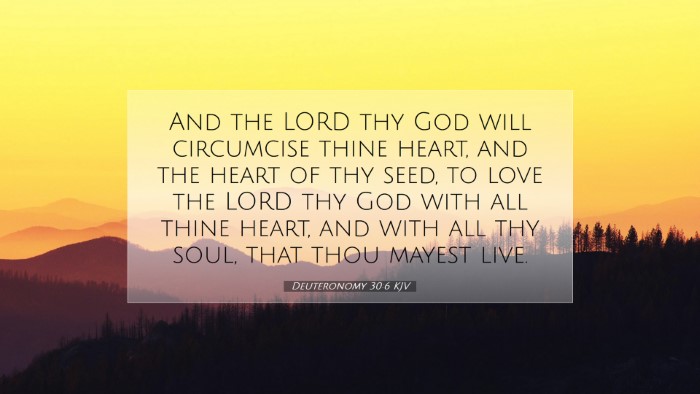Commentary on Deuteronomy 30:6
Verse: "And the LORD thy God will circumcise thine heart, and the heart of thy seed, to love the LORD thy God with all thine heart and with all thy soul, that thou mayest live."
Introduction
This verse sits at the heart of Moses' address to the Israelites as they prepare to enter the Promised Land. It encapsulates the core of covenant theology, emphasizing the transformation that God brings about in the hearts of His people, fostering a profound love for Him. It highlights the interplay of divine initiative and human response in the covenant community.
Exegesis and Themes
Circumcision of the Heart: The imagery of "circumcision" is deeply rooted in the Old Testament. Traditionally, it referred to the physical act required by the covenant given to Abraham. However, here it points to a spiritual renewal—an inner transformation that God performs. As Albert Barnes notes, this act symbolizes the removal of spiritual obduracy and the ability to respond to God.
The Love of God: The command to love God "with all thine heart and with all thy soul" echoes throughout Scripture, signifying the holistic nature of devotion that encompasses emotion, will, and intellect. Adam Clarke emphasizes that this love is not incidental; it is the very purpose of this internal circumcision, leading to a true, vibrant faith that animates the believer's life.
Theological Insights
- Divine Initiative: The phrase "the LORD thy God will circumcise thine heart" reveals that it is God who initiates this transformation. Matthew Henry highlights that the change of heart is a prerequisite for the genuine love and service of God, thus emphasizing divine grace in effecting spiritual change.
- Covenantal Context: The promise is set within the covenant framework, suggesting that God's work in the hearts of His people is contingent upon their response to His law and commandments. This reinforces the notion that while salvation is a work of grace, human response through faith and obedience is equally vital.
- Generational Impact: The mention of "the heart of thy seed" signifies the generational aspect of covenant blessings. This illustrates a profound truth about faith being transmitted across generations; as parents experience transformation, they become conduits of God's grace to their children, enhancing the community of faith.
Practical Applications
Personal Renewal: For pastors and believers alike, this verse challenges us to seek a true circumcision of the heart. Reflection upon our deep inner motives and affections can lead to necessary renewals in our spiritual lives. This calls for prayer and dependence on the Spirit of God to initiate that transformative work.
Community and Discipleship: The principle of impacting the “heart of thy seed” reminds leaders of their role in teaching and nurturing the next generation in love for God. It prompts a commitment to discipleship that focuses on fostering genuine affection for God, rather than mere adherence to rules.
Encouragement amidst Struggles: For those pastoral leaders who find themselves weary or struggling with spiritual stagnation within their communities, this promise serves as a powerful reminder that it is God who works within us "both to will and to do of His good pleasure" (Philippians 2:13). Trusting in His promises cultivates hope and perseverance.
Conclusion
Deuteronomy 30:6 stands as a profound testament to God's commitment to His people and His transformative power. Understanding the depth of this verse through the insights of public domain commentaries enriches our comprehension of not just God's covenant with Israel, but of His ongoing work within the church today. Emphasizing both His sovereignty and humanity’s responsibilities fosters a holistic understanding of our relationship with God and our communal life as His people.


